The information found here is designed to help a wide array of people, including the following:
- Victims of semi truck accidents
- Attorneys representing tractor trailer accident victims
While you are reading, you can expect to learn:
- The primary Means of Finding Truck Accident Fault
- Laws Relevant to Semi-Truck Accidents
- How to Punish Tractor Trailer Truck Companies for Disregarding Safety
- Semi Truck – Tractor Trailer Accident Statistics
- Semi Truck Accident Experts
- How to Find the Best Tractor Trailer Accident Law Firm
The semi truck accident attorneys at Hamilton and Associates help victims of semi truck accidents and their families. Their job is to recover money for the payment of medical bills, employment loss, property damage, and future damages. Semi Truck accidents differ from other truck accidents because the regulations and laws differ. Tractor Trailer accidents also differ with respect to the way the case is litigated.
Negligence and Negligence Per Se in Semi Truck Accidents
The laws of Missouri require every driver, including semi-truck tractor trailer drivers, to obey a particular standard. This standard is that each driver must drive with “highest degree of care” as “a careful and prudent driver” should. R.S.Mo. § 304.012.
The Missouri driver manual and trucking manual are often used to measure whether the Missouri standard (“the highest degree of care”) was met. The attorney takes the facts of the semi truck accident (after the investigation phase) and applies them to this standard. The truck accident claim will then focus on everything that should have been done, could have been done, but was not done. This is a typical standard for negligence case and is representative of all auto accident lawsuits.
The Missouri Supreme Court added a second kind of negligence, which has been heavily used in the last 70 years. This is known as the law of negligence per se. The case King v. Morgan, 873 S.W.2d 272 (Mo.App. W.D. 1994), stated the elements of negligence per se. They are:
- The relevant statute must include a standard of care
- The injured party must be in the class of persons the statute was enacted to protect.
- The statute must have been enacted to protect persons from injury, property loss, to conserve public health, or promote public safety.
See also Moore v. Riley, 487 S.W.2d 555, 558 (Mo. 1972); State ex rel. Wells v. Mayfield , 365 Mo. 238, 246-47, 281 S.W.2d 9, 13 (Mo. banc 1955).
Negligence per se is applied in injury accident cases by admitting into evidence the standard (duty) two ways simultaneously. Both the standard by statute (under RSMo. § 304.012) and the standard by negligence are used. Then, evidence is admitted showing how the semi truck driver caused the accident by failing to abide by the statute.
Negligence per se has several advantages over ordinary common law negligence in trucking accident cases. First, the general negligence standard of “highest degree of care” is ambiguous and difficult for some jurors to apply. Instead, negligence per se gives a bright-line easy to understand statute that was violated contributing to cause the trucking accident. Therefore, the first advantage of negligence per se in trucking accidents is its clarity in instructing the jury.
A second advantage of negligence per se in semi truck accidents is the severity of the violation. Ordinary jurors may have sympathy for a driver who failed to drive suing the highest degree of care (as many people do on the road anyways). However, this sympathy dissipates when it is a tractor trailer accident and moreover when a specific statute has been violated.
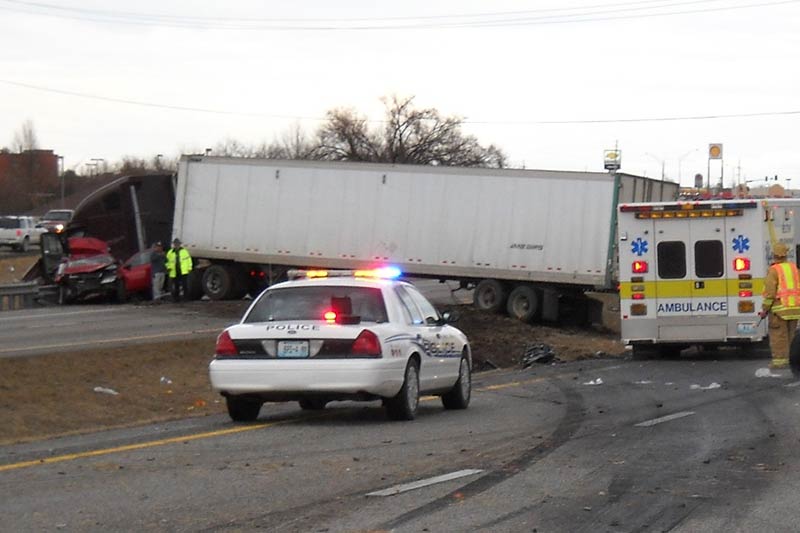
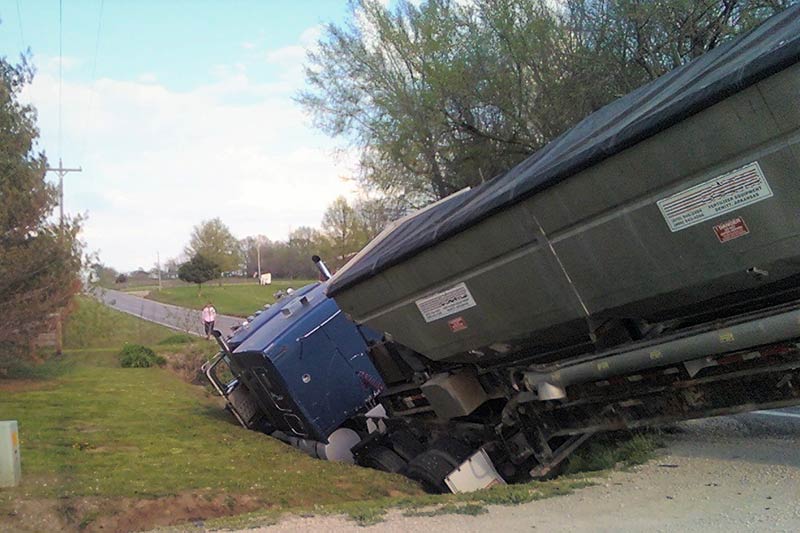
Negligence: Enhanced Duties for Tractor Trailer Accidents
Negligence per se is used in many ways. We outline in this section the various laws that a tractor trailer accident victim may employee to show how the semi trucker was at fault for the accident. These laws and duties are specific to truck drivers. The accident should be investigated fully, then, the laws should be compared to the facts to show which have been violated.
Regulations Relevant to Tractor Trailer Accidents
The code of federal regulations under its transportation section (C.F.R.) has various regulations that apply to trucking accidents. Most notably, the hours of service required of tractor trailer – semi truck drivers is listed here. These regulations should be applied in cases where the trucking accident alleges a distracted, sleepy, or exhausted truck driver.
Missouri State Tractor Trailer Accident Laws
The following laws apply to Missouri trucking accidents. They should be examined to determine which applies to your case. Negligence per se maybe employed for these violations. They are also relevant to punitive damage claims (see later).
State Laws Relevant to Semi Truck Accidents
What Constitutes a CMV
- V.A.M.S. 302.700
- 49 CFR § 383.5 – Definitions
Major Disqualifying Offenses
- V.A.M.S. 302.700
- 49 CFR § 383.51 – Disqualification of Drivers
- V.A.M.S. 302.750
- 49 CFR § 383.51 – Disqualification of Drivers
- V.A.M.S. 302.755
- 49 CFR § 383.51 (b) – Disqualification for major offenses
Major Disqualifying Offenses (Alcohol)
- V.A.M.S. 302.700
- 49 CFR § 383.51 – Disqualification of Drivers
- 49 CFR § 383.72 – Implied consent to alcohol testing
- V.A.M.S. 302.750
- 49 CFR § 383.51 – Disqualification of Drivers
- 49 CFR § 383.72 – Implied consent to alcohol testing
- V.A.M.S. 302.755(1)(1)
- 49 CFR § 392.5 – Alcohol prohibition
- V.A.M.S. 302.755(6)
- 49 CFR § 383.51 – Disqualification of Drivers
- 49 CFR § 383.72 – Implied consent to alcohol testing
- 49 CFR § 392.5 (c) – Alcohol prohibition: “Out-of-Service”
Serious Traffic Offenses
- 12 CSR 10-24.428
- 49 CFR § 383.51 – Disqualification of Drivers
- V.A.M.S. 302.700(30)
- 49 CFR § 383.51 (c) – Disqualification for serious traffic violations
Identification of Conviction
- V.A.M.S. 302.700
- 49 CFR § 383.5 – Definitions
Masking Convictions
- V.A.M.S. 302.345
- 49 CFR § 384.226 – Prohibition on masking convictions
10-Day Posting Requirement
- V.A.M.S. 302.760
- 49 CFR § 383.51 – Disqualification of Drivers
- V.A.M.S. 302.600
- 49 CFR § 384.209 – Notification of traffic violations
- V.A.M.S. 302.347
- 49 CFR § 384.225 – CDLIS driver recordkeeping
Other CDL Provisions
- V.A.M.S. 195.005 to 195.425
- 21 CFR § 1308 (Schedules I-V) – Schedule of Controlled Substances
- V.A.M.S. 302.700(21)
- 49 CFR Part 172 Subpart F
- V.A.M.S. 302.700
- 49 CFR § 382.107 – Definitions
- V.A.M.S. 302.775
- 49 CFR § 383.3 – Applicability
- V.A.M.S. 302.775(2)
- 49 CFR § 383.3 (c) – Exception for certain military drivers
- V.A.M.S. 302.775(1)
- 49 CFR § 383.3 (d) (1) – Exception for operators of a farm vehicle
- V.A.M.S. 302.775(3)
- 49 CFR § 383.3 (d) (2) – Exception for firefighters and emergency response vehicle drivers
- V.A.M.S. 302.775(6)
- 49 CFR § 383.3 (d) (3) – Exception for drivers removing snow and ice
- 49 CFR § 383.3 (f) – Restricted CDL for certain drivers in farm-related service industries
- 49 CFR § 383.3 (g) – Restricted CDL for certain drivers in the pyrotechnic industry
- V.A.M.S. 302.700
- 49 CFR § 383.5 – Definitions
- V.A.M.S. 302.755
- 49 CFR § 383.51 – Disqualification of Drivers
- V.A.M.S. 304.035
- 49 CFR § 383.51 (d) – Railroad-highway grade crossing violations
- 49 CFR § 383.53 (c) – Special penalties pertaining to railroad-highway grade crossing violations
- V.A.M.S. 302.755(7) to 302.755(12)
- 49 CFR § 383.51 (e) – Disqualification for violating “out-of-service” orders
- V.A.M.S. 302.720(5)
- 49 CFR § 384.210 – Limitation on licensing
Missouri Judge Cases for Tractor Trailer Accidents
There are also “common law” duties that truck drivers must adhere to for semi truck accident cases. These relate to the common law duty of negligence in driving like a careful and prudent truck driver. They might also be applied to negligence per se situations, depending on which case is being cited.
The relevant cases for recent truck driver incidents as follows:
Addison v. Director of Revenue, 302 S.W.3d 735 (2010)
Akins v. Director of Revenue, 303 S.W.3d 563 (2010)
Baber v. Director of Revenue, State, 317 S.W.3d 680 (2010)
Bender v. Director of Revenue, 320 S.W.3d 167 (2010)
Bieker v. Director of Revenue, 345 S.W.3d 254 (2010)
Bland v. Director of Revenue, 324 S.W.3d 451 (2010)
Bone v. Director of Revenue, 404 S.W.3d 883 (2013)
Bouillon v. Director of Revenue, 306 S.W.3d 197 (2010)
Bowers v. Director of Revenue, 193 S.W.3d 887 (2006)
Bruce v. State, Dept. of Revenue, 323 S.W.3d 116 (2010)
Cardenas v. Director of Revenue, 339 S.W.3d 608 (2011)
Coble v. Director of Revenue, 323 S.W.3d 74 (2010)
Covert v. Director of Revenue, 344 S.W.3d 272 (2011)
Davis v. Director of Revenue, 346 S.W.3d 319 (2011)
Downs v. Director of Revenue, 344 S.W.3d 818 (2011)
Folkedahl v. Director of Revenue, 307 S.W.3d 238 (2010)
Grafeman v. Director of Revenue, 344 S.W.3d 861 (2011)
Holloway v. Director of Revenue, 324 S.W.3d 768 (2010)
Johnston v. Director of Revenue, 305 S.W.3d 465 (2010)
Linhardt v. Director of Revenue, 320 S.W.3d 202 (2010)
Mason v. Director of Revenue, 321 S.W.3d 426 (2010)
Mayfield v. Director of Revenue, MO, 335 S.W.3d 572 (2011)
Neal v. Director of Revenue, State, 312 S.W.3d 444 (2010)
Norris v. Director of Revenue, 304 S.W.3d 724 (2010)
Prins v. Director of Revenue, 333 S.W.3d 17 (2010)
Pruitt v. Director of Revenue, 303 S.W.3d 658 (2010)
Radmacher v. Director of Revenue, 405 S.W.3d 607 (2013)
Rohlman v. Director of Revenue, 323 S.W.3d 459 (2010)
Ross v. Director of Revenue, 311 S.W.3d 732 (2010)
Schneider v. Director of Revenue, 339 S.W.3d 533 (2011)
Sostman v. Director of Revenue, 363 S.W.3d 55 (2011)
State v. Chong-Aguirre, 413 S.W.3d 378 (2013)
Strup v. Director of Revenue, 311 S.W.3d 793 (2010)
Weil v. Director of Revenue, 304 S.W.3d 768 (2010)
White v. Director of Revenue, 321 S.W.3d 298 (2010)
Williams v. Director of Revenue, 335 S.W.3d 70 (2011)
The attorneys at Hamilton and Associates have even handled several of these truck accident appeals. Our targeted experience in truck accidents can help with applying these cases to your collision case.
Punitive Damages in truck accident
Punitive damage claims present several advantages when making a tractor trailer semi truck accident lawsuit. First, the allegations of punitive damages increase the likelihood of an early settlement. Second, punitive damage claims in truck accidents increase the value of the case. Third, punitive damage claims increase the scope of the evidence admitted at trial. They tend to anger the jury once it finds out what all the trucking company has been doing. This benefits semi truck accident victims.
Missouri has a number of laws that must be applied if one is making a claim for punitive damages in a truck accident. For example, “Ordinarily [exemplary] damages are not recoverable in actions for negligence, because negligence is a mere omission of the duty to exercise care, and is therefore the antithesis of willful or intentional conduct.” Hoover’s Dairy, Inc. v. Mid-America Dairymen, Inc./Special Products, Inc., 700 S.W.2d 426, 435 (Mo. banc 1985), quoting Sharp v. Robberson, 495 S.W.2d 394, 397 (Mo. banc 1973)).
The standard for recovering punitive damages for tractor trailer accidents in Missouri was set out in the case of Menaugh v. Resler Optometry, Inc., 799 S.W.2d 71, 73 (Mo. banc 1990) and its companion cases. In Menaugh v. Resler Optometry, Inc., Stojkovic v. Weller, 802 S.W.2d 152, 155 (Mo. banc 1991), and Call v. Heard, 925 S.W.2d 844, 852 (Mo. banc 1996), the Missouri Supreme Court upheld the application of punitive damages in negligence cases where the defendant’s conduct established the defendant’s conscious disregard and reckless indifference to the safety of others.
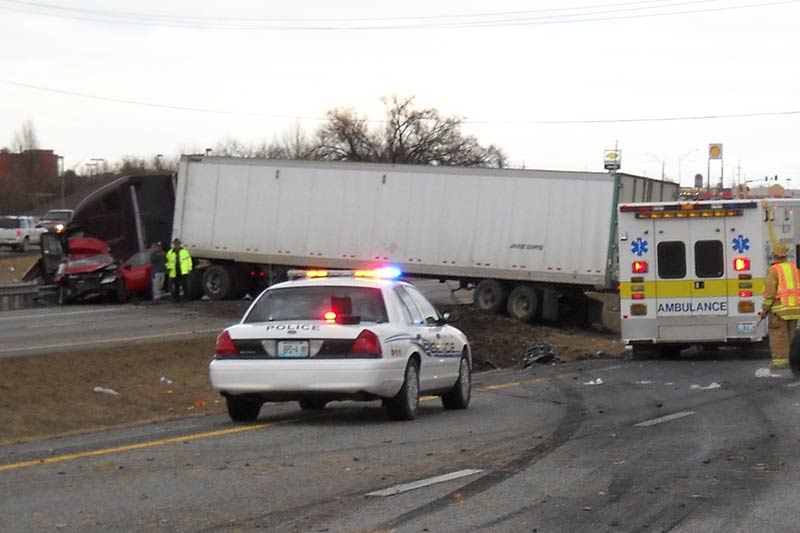
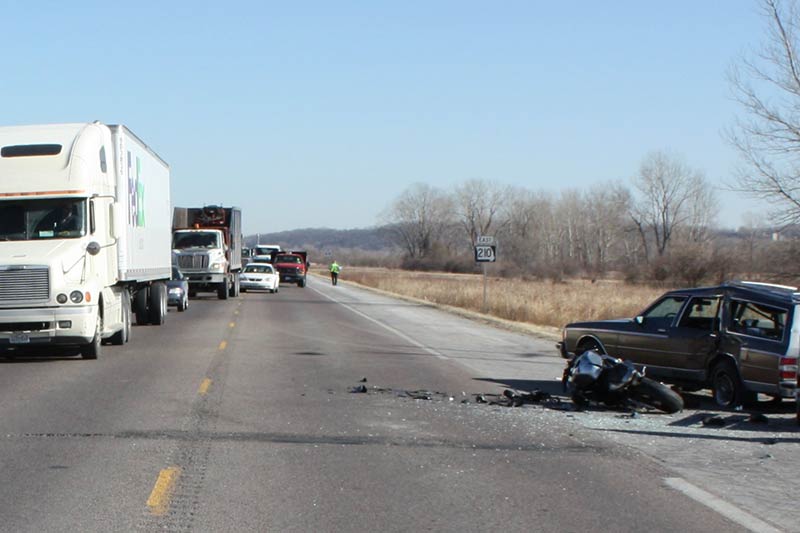
In these three cases, the Supreme Court of Missouri upheld the application of punitive damages even in negligence cases. The Missouri standard for punitive damages in a tractor trailer semi truck accident: A conscious disregard and reckless indifference for the safety of others – “Conscious disregard” or “complete indifference” includes situations where the person doing the act or failing to act is conscious (from the knowledge of surrounding circumstances and existing conditions) that (although lacking specific intent to injure) the person’s conduct or failure to act will naturally or probably result in injury. Hoskins v. Business Men’s Assurance, 116 S.W.3d at 557, 564 (Mo.App. 2003).
The way to apply the standard of conduct in a punitive damage case is to look to the conduct of the driver and the tractor trailer company itself. There are two general ways in which punitive damages is established. First, the activity of the semi truck driver or tractor trailer company is compared on specific bases. The specific actions on a specific time period and specific location are looked to. If these are outrageous or appear morally evil, punitive damages may be appropriate.
The second manner of applying punitive damages to tractor trailer accidents is the wider more general approach. This is the common situations were semi truck companies and drivers ignore safety regulations over and over, again and again, over a long period of time. These may not risk a high degree of danger on any one particular instance. However, applied over time, and over many drivers and many miles, it becomes a near certainty that an injury or death semi truck accident will result. This broad application of evidence is how punitive damages are established in an aggregate manner.
As the Missouri Court of Appeals has stated, the “evidence must show that the defendant either knew or had reason to know that there was a high degree of probability that the defendant’s conduct would result in injury.” Lopez v. Three Rivers Elec. Co-op., Inc., 26 S.W.3d 151, 160 (Mo. banc 2000).
A Different Standard of Proof for Punitive Damages
There is one last hurdle to cross to have a punitive damages claim in a tractor trailer accident. Ordinarily, the standard to prove anyone fact under Missouri law is “more likely than not” or more than 50% likely. This can be visualized as the scales of justice. If they tip slightly in one direction or the other that person wins.
This is not so in punitive damages cases. The higher standard for punitive damages in Missouri is that they must be proven by clear and convincing evidence. Blue v. Harrah’s North Kansas City, LLC, 170 S.W.3d 466, 477 (Mo.App. W.D. 2005). The clear and convincing standard for punitive damages is generally decided by the judge. The trial judge must approve that the clear and convincing standard has been met to submit the claim to the jury.
Hiding or Destroying Evidence from a Tractor Trailer Accident
Each semi truck company typically has a set schedule where they erase log books, drivers’ schedules, and other evidence important to a truck accident. It is important that your tractor trailer accident lawyer at the outset of the case send a letter to the semi truck company and any other businesses involved so that this evidence is preserved. If the evidence is destroyed anyway, the semi truck accident attorney may get an instruction from the judge to present to the jury about the intentional destruction of evidence.
Truck Accident Attorney Kansas City Process
The tractor trailer accident lawyers at Hamilton and Associates have a specific process we employee for semi truck accident cases. At the outset, a spoliation letter is sent to each trucking company and driver informing it of the need to preserve evidence and not destroy it though it may be scheduled for discard.
Simultaneously, an immediate, thorough, and complete investigation is made. This is one of the advantages that sets the best tractor trailer accident law firms apart from other personal injury law firms. The facts are the very foundation of one’s case. It is inadequate to hire a lawyer who will merely sit back at his desk and litigate a case without getting out in the field and discovering the facts personally. In practice, a thorough investigation is often not done either by the victim’s attorney or the tractor trailer trucking company itself. A thorough investigation early on gives an advantage to the diligent side. Further, evidence is often lost during the first few days due to a road clean up, weather, or the natural process of things. An immediate investigation preserves evidence for later use.
Proper medical treatment is needed for each semi truck accident victim. First, for one’s health, the best medical treatment is preferable. Also, what the medical damages are will be a major issue in the case. These include past medical bills and treatment. Most importantly, the medical treatment evidence must take in count the future. Tractor trailer accidents often result in lifelong disability and limitations. Future medical treatments may be expensive. It is important to have the right treatment evidence for proper and full case value.
The best semi truck accident attorney employ better experts. Tractor trailer accidents take into account experts in the trucking industry that can advise the jury of the laws and standards to apply to the driver. Accident reconstruction and other experts are also used.
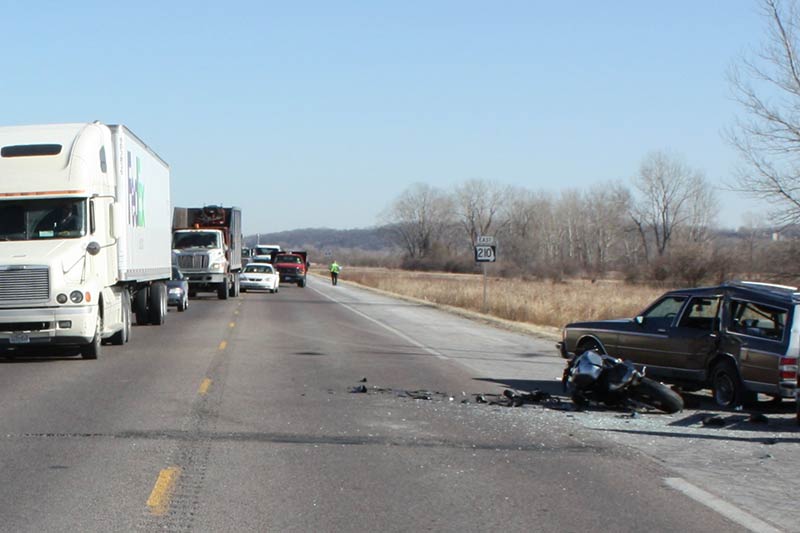
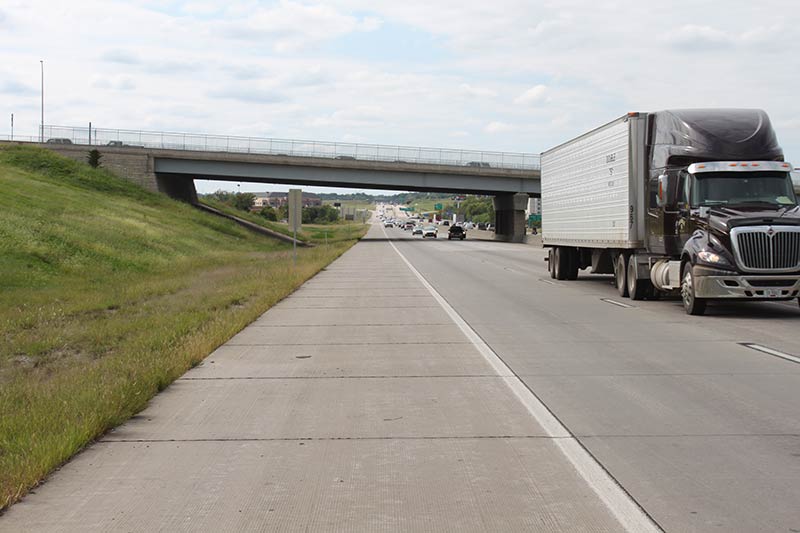
Experts To Use for a Tractor Trailer Accident
 The semi truck accident attorney Kansas City at Hamilton and Associates apply the following types of experts:
The semi truck accident attorney Kansas City at Hamilton and Associates apply the following types of experts:
- Trucking Industry = duties to drivers, companies, and the public for purposes of establishing negligence
- Accident reconstruction = a complete and thorough investigation of the trucking accident, the scene, and the vehicles
- Medical damage = surgeons, physicians, and consultants to establish past suffering, future disability, and treatment
- Employment loss = experts to identify the full amount of wage loss over the lifetime of the victim
- Life Care expert = an expert retained to add up the total amount of cost to the victim over their lifetime for everyday materials for value of the case
- Economist = the present value of the total loss also adding up all the various losses for the full large number for the jury to consider
How Semi Truck Drivers are at Fault
Semi Truck drivers are often at fault in accidents. This can arise from the following failures:
- Distracted driving
- Failure to obey traffic signals
- Improper merging
- Following too close or tailgating
- Drunk driving
- Driving under the influence of drugs
- Sleepy driving
- Illegal parking
How to select What is The Best Semi truck accident attorney kansas city?
The selection of a semi truck accident attorney is a critical component of getting timely and full compensation for the accident. We suggest you ask each lawyer you interview their process and their experience in trucking cases. You will soon learn that some have a more in-depth knowledge of the process than others. You will notice some attorneys have a greater knowledge of the laws involved than others. Avoid sales pitches. Choose a law firm that is going to aggressively get out there and investigate early on, and not simply make promises. In the end you will be happier.
Tractor Trailer – Semi Truck Accidents Statistics
- In 2014, 3,978 large trucks and buses were involved in fatal crashes
- There was a 33-percent decrease in the number of fatal crashes involving large trucks or buses between 2004 and 2009, followed by an increase of 20 percent between 2009 and 2013. From 2013 to 2014, the number of fatal crashes involving large trucks or buses decreased by 4.5 percent.
- The number of injury crashes involving large trucks or buses decreased steadily from 95,000 in 2004 to 60,000 in 2009 (a decline of 37 percent). This decline was followed by an increase of 55 percent from 2009 to 2014.
- The number of large trucks involved in fatal crashes decreased by 5 percent, from 3,921 to 3,744,
- The number of large trucks involved in injury crashes increased by 21 percent, from 73,000 to 88,000
- The number of large trucks involved in property damage only crashes increased by 31 percent, from 265,000 to 346,000, and the large truck involvement rate in property damage only crashes increased by 29 percent.
- The number of buses involved in fatal crashes decreased from 282 to 234, a decrease of 17 percent, and the bus involvement rate in fatal crashes decreased by 21 percent.
- Approximately 411,000 police-reported crashes involving large trucks in 2014. 3,424 (1 percent) of accidents resulted in at least one fatality, and 82,000 (20 percent) resulted in at least one nonfatal injury.
- Approximately 61 percent of all fatal crashes involving large trucks on rural roads and 26 percent on rural or urban Interstate highways.
- Thirty-seven percent of all fatal crashes, 19 percent of all injury crashes, and 20 percent of all property damage only crashes involving large trucks at night (6:00 pm to 6:00 am).
- The vast majority of fatal crashes (84 percent) and nonfatal crashes (88 percent) involving large trucks occurred on weekdays (Monday through Friday).
- About 2 percent of all the drivers of large trucks involved in fatal crashes in 2014 were female, compared with 30 percent of all drivers of buses involved in fatal crashes.
